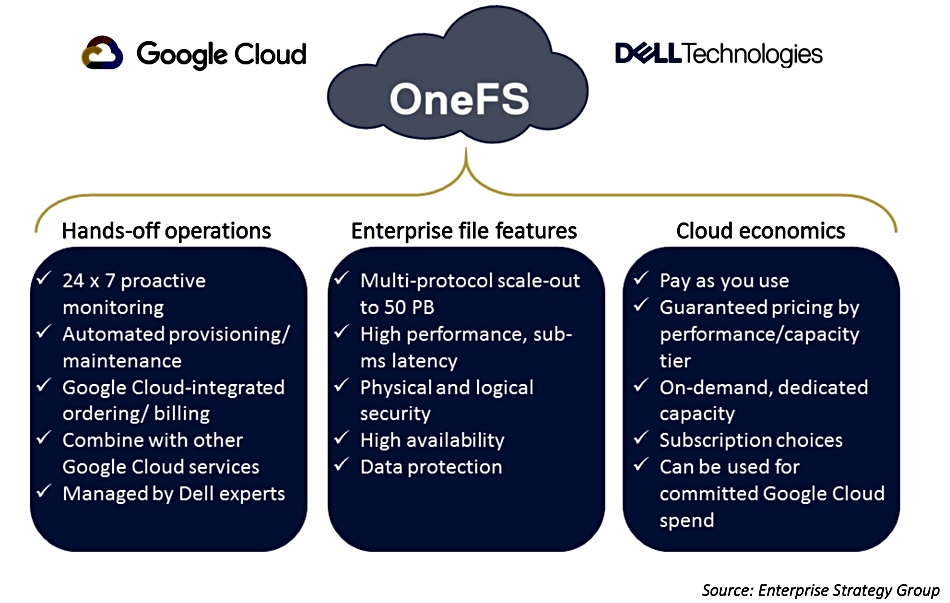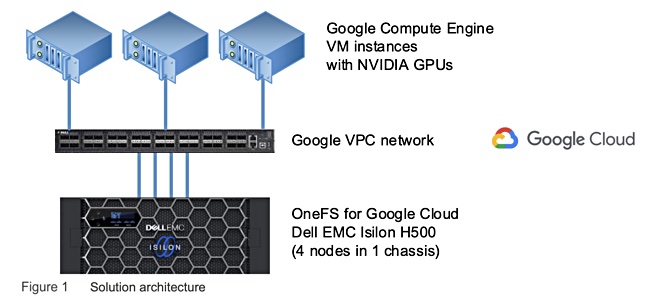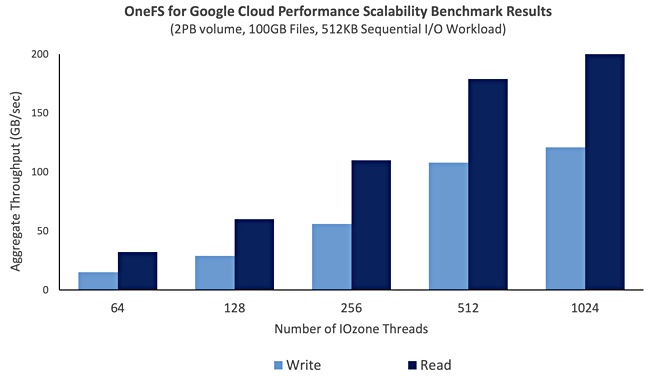Update: May 26, 2020. Customer availability note added.
Dell Technologies has added the scale-out Isilon OneFS file server to Google Cloud. Customers get 50PB file name space and 200GB per second aggregate throughput, which is managed by Dell Enterprise Services and billed through Google.
OneFS for Google Cloud provides terabit networking and sub-millisecond latency between the Isilon hardware and Google Compute Engine services. The annual subscription service can count toward any committed Google Cloud spend.

The OneFS software has not actually been ported to run on Google hardware within Google Cloud. The planting of Isilon filers in to the Google Cloud is more akin to NetApp’s Azure NetApp Files, where NetApp filers are placed in Azure data centres.
Customers order the Isilon service via Google Cloud Marketplace. Customers are provided with Isilon Gen6 hardware and configuration and management is conducted through the Google Cloud console. Each Isilon cluster is dedicated to a single customer, so performance is predictable and data tenancy is assured. There are no egress charges associated with moving data between this storage platform and other Google Cloud services.
Existing applications using Isilon OneFS file storage can run in Google Cloud and use OneFS in the same way.
A Dell Technologies white paper shows how OneFS for Google Cloud can be used for deep learning and illustrates an example setup:

Isilon hardware communicates across a Google Virtual Private Cloud (VPC) for access by Google compute instances. VPCs are global resources and are not associated with any particular region or zone.
Dell Technologies did not provide any availability information. Blocks and Files suspects there will be geographic availability restrictions.
Competition and Performance
Isilon’s OneFS joins Filestore, NetApp Cloud Volumes, Google’s Elastifile and Panzura as file server suppliers in GCP. Qumulo is also available for Google’s cloud but listed separately. In that listing Qumulo claims it’s the fastest and most affordable file system in the cloud. This claim may now be out of date.
Sanzi’s high-performance point is backed by ESG, a technology analyst, firm, which ran OneFS for Google Cloud through some benchmarks.
ESG used the IOzone, an industry-standard benchmark, and Scratch DNA, a benchmarking tool that emulates the write-intensive storage workloads typically generated in genomics research. It tested a 2PB OneFS file system with peak 200GB/sec aggregate read throughput and 121GB/sec aggregate write throughput on IOzone (1024 threads). Scalability was linear. The peak Scratch DNA aggregate write throughput was 110 GB/sec.

Response time was under a millisecond. ESG compared this to a mystery Vendor X competitive NAS supplier running on Google Cloud. It refused to identify who it was, and acknowledged that vendor’s release numbers used a smaller workload and smaller filesystem. That said, OneFS offers up to 500x higher file system capacity, 46x maximum read throughput and 96x higher maximum write throughput.
A 500X higher capacity, based on OneFS’s 50PB limit, would mean a 100TB limit. NetApp Cloud Volumes offers up to 100TB. Qumulo on Google Cloud scales to the petabytes level. Filestore scales up to 63.9TB. We couldn’t find a capacity limit for Panzura but nonetheless we think ‘Vendor X’ is NetApp and its Cloud Volumes product.
A NetApp Azure benchmark webpage talks of Azure NetApp Files delivering 30MiB of bandwidth with a 5TiB volume. It delivers around 1,600MIB/sec writes and 4,500MIB/sec reads on a Linux system. MySQL latency was between 1.8 and 4.6ms.
There’s no obvious apples-to-apples comparison here but our impression is that OneFS for Google Cloud is faster than Azure NetApp Files.
Dell is the top scale-out file system vendor in IDC’s Worldwide Scale-Out File-Based Storage 2019 Vendor Assessment, ranking above NetApp, IBM and Qumulo.
Update. A Dell spokesperson tells us that customers in North America, Singapore and Sydney will be able to take advantage of OneFS for Google Cloud at launch, with additional global locations to be announced based on customer demand.







